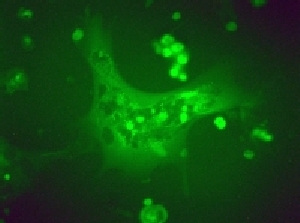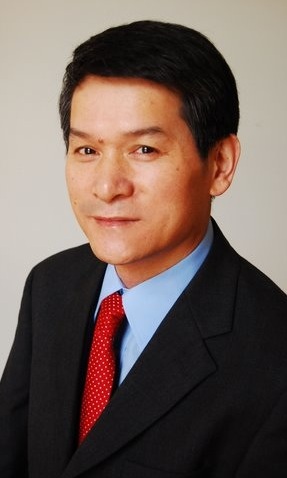Zhang Lab
Shaun Xiaoliu Zhang, M.D., Ph.D.
M.D. Anderson Professor and Chair
Department of Biology and Biochemistry
Office: SERC, 3005
Contact: shaunzhang@uh.edu - 832-842-8842
M.D. Anderson Professor Shaun Xiaoliu Zhang brings a unique blend of academic and industrial research experience to the UH Center for Nuclear Receptors and Cell Signaling. Zhang joined the Center in 2009 to continue pursuing translational research in virology, oncology and immunotherapy. He is now focused on the clinical application of a virus which seeks and destroys cancer cells.

“Our most promising project to date would be the development and patenting of FusOn-H2, a modified version of a type II herpes simplex virus,” says Zhang. “FusOn-H2 can selectively target and destroy tumor cells without consequence to normal, healthy cells and tissue.”
Contrary to traditional cancer treatments, virotherapy is focused on the modification of benign viruses for the purpose of attacking cancer cells. The killing activity on tumor cells by FusOn-H2 was also found to reenergize the body’s immune system. The unconventional approach is recognized as one of the more promising alternatives to traditional cancer treatments, such as surgery and chemotherapy.
The team currently is using preclinical tumor models to study the precise delivery of the oncolytic virus to tumor sites. The results may be beneficial in the treatment of a variety of cancers, such as breast cancer and prostate cancer. Zhang is specifically interested in pancreatic cancer due to its resistance to radiation and chemotherapy treatments. Future plans for the lab include the pursuit of nanoparticle-mediated drug delivery, another new approach to cancer treatment.
Funding


William & Ella Owens Medical Research

Shaun Xiaoliu Zhang, M.D., Ph.D.
M.D. Anderson Professor and Chair
Department of Biology and Biochemistry
University of Houston
Houston, Texas 77204-5001
Office: SERC 545, 3005
Phone: 832-842-8842
shaunzhang@uh.edu

Tomasz Benedyk
Postdoctoral Fellow

Mohamed Elsayed
Graduate Student

Aiwu Jin
Research Lab Manager
ajin2@uh.edu

Jing Ting (Jane) Lim
Graduate Student
jlim22@cougarnet.uh.edu
Kyle Johnson
Graduate Student
kgjohns4@cougarnet.uh.edu
Alumni
Nouran Farag
Intern
Xinping Fu
Research Associate Professor
Kevin Nguyen
Intern
Lihua Tao
Research Technician
- Xinping Fu, Lihua Tao and Xiaoliu Zhang. A chimeric virus-based probe unambiguously detects live circulating tumor cells with high specificity and sensitivity. Submitted.
- Divya Ravirala, Guangsheng Pei, Zhongming Zhao, Xiaoliu Zhang (2021). Single-cell RNA sequencing reveals a strong connection between Gadd45g upregulation and oncolytic HSV infection in tumor tissue. Submitted.
- Divya Ravirala, Guangsheng Pei, Zhongming Zhao, Xiaoliu Zhang (2021). Comprehensive characterization of virotherapy-induced immune landscape changes by single cell RNA sequencing. Submitted.
- Drew Ashton Boagni and Shaun Xiaoliu Zhang (2021). Current strategies in engaging oncolytic viruses with antitumor immunity. Molecular Therapy - Oncolytics. In press.
- Divya Ravirala, Brandon Mistretta, Preethi Gunaratne, Guangsheng Pei, Zhongming Zhao, Xiaoliu Zhang (2021). Co-delivery of novel bi-specific and tri-specific engagers by an amplicon vector augments the therapeutic effect of a HSV-based oncolytic virotherapy. J Immunother Cancer. 2021 Jul;9(7). doi: 10.1136/jitc-2021-002454. PubMed PMID: 34230110.
- Xiaohui Liu, Yi-Ling Wang, Jacky Wu, Jianjun Qi, Zihua Zeng, Quanyuan Wan, Zhenghu Chen, Pragya Manandhar, Victoria S Cavener, Nina R Boyle, Xinping Fu, Eric Salazar, Suresh V Kuchipudi, Vivek Kapur, Xiaoliu Zhang, Michihisa Umetani, Mehmet Sen, Richard C Willson, Shu-Hsia Chen, Youli Zu. Neutralizing Aptamers Block S/RBD-ACE2 Interactions and Prevent Host Cell Infection. Angew Chem Int Ed Engl. 2021 Mar 8.doi: 10.1002/anie.202100345. Online ahead of print.
- Xinping Fu, Lihua Tao and Xiaoliu Zhang (2021). Comprehensive and systemic optimization for improving the yield of SARS-CoV-2 spike pseudotyped virus. Molecular Therapy - Methods & Clinical Development. 20:350-356.
- Xinping Fu, Lihua Tao, Wanfu Wu and Xiaoliu Zhang (2020). Arming HSV-based oncolytic virus with the ability to re-direct host's innate immune cells to attack tumor cells. Molecular Therapy - Oncolytics. 19:33-46.
- Xinping Fu, Lihua Tao and Xiaoliu Zhang (2018). Genetically coating oncolytic herpes simplex virus with CD47 allows efficient systemic delivery and prolongs virus persistence at tumor site. Oncotarget: 9(77):34543-34553.
- Xinping Fu, Lihua Tao, Pin-Yi Wang, Timothy P. Cripe and Xiaoliu Zhang (2018). Comparison of infectivity and spread between HSV-1 and HSV-2 based oncolytic viruses on tumor cells with different receptor expression profiles. Oncotarget: 9(30):21348-21358.
- Mark A White, Efrosini Tsouko, Chenchu Lin, Kimal Rajapakshe, Jeffrey M Spencer, Sandi R Wilkenfeld, Sheiva S Vakili, Thomas L Pulliam, Dominik Awad, Fotis Nikolos, Rajasekhara Reddy Katreddy, Benny Abraham Kaipparettu, Arun Sreekumar, Xiaoliu Zhang, Edwin Cheung, Cristian Coarfa and Daniel E Frigo (2018). GLUT12 promotes prostate cancer cell growth and is regulated by androgens and CaMKK2 signaling. Endocrine-Related Cancer. 25 (4):453-469.
- Louiza Belkacemi, Jason Atkins, Lu Yang, Prajakta Gadgil, Amy Sater, Diana Chow, Rathindra N Bose and Shaun Xiaoliu Zhang (2018). Phosphaplatin Anti-tumor Effect Enhanced by Liposomes Partly via an Up-regulation of PEDF in Breast Cancer. Anticancer Res. 38(2): 623-646.
- Jeffrey M Spencer and Xiaoliu Zhang (2017). Deep mutational scanning of S. pyogenes Cas9 reveals important functional domains. Scientific Reports. 7(1): 16836.
- Louiza Belkacemi and Shaun Xiaoliu Zhang (2016). Anti-tumor effects of pigment epithelium-derived factor (PEDF): implication for cancer therapy. A mini-review. J Exp Clin Cancer Res. 35(1):4.
- Armando Rivera, Xinping Fu, Lihua Tao and Xiaoliu Zhang (2015). Expression of mouse CD47 on human cancer cells profoundly increases tumor
metastasis in murine models
BMC Cancer. 15(1): 964-974. - Shaun Xiaoliu Zhang (2015). Turning killer into cure - the story of oncolytic herpes simplex viruses. Discovery Medicine. 20 (111): 303-309.
- Kwan Joong Joo, Hongtao Li, Xiaoliu Zhang and Seth P. Lerner (2015). Therapeutic Effect on Bladder Cancer with a Conditionally Replicating Oncolytic Virus Derived from Type II Herpes Simplex Virus. Bladder Cancer. 1(1): 81-90.
- X. Fu, L. A. Rivera, Tao and X. Zhang (2015). An HSV-2 based oncolytic virus can function as an attractant to guide migration of adoptively transferred T cells to tumor sites. Oncotarget. 6(2):902-914.
- Shana Williamson Loya and Xiaoliu Zhang (2015). Enhancing The Bystander Killing Effect Of An Oncolytic HSV By Arming It With A Secretable Apoptosis Activator. Gene Ther. 22, 237–246.
- Zhen Yang , Liangzi Deng , Yucheng Lan , Xiaoliu Zhang , Zhonghong Gao , Ching-Wu Chu, Dong Cai , Zhifeng Ren (2014). Molecular extraction in single live cells by sneaking in and out magnetic nanomaterials. PNAS. 111(30): 10966-71.
- Kim Anthony, Abhijit More and Xiaoliu Zhang (2014). Activation of silenced cytokine gene promoters by the synergistic effect of TBP-TALE and VP64-TALE activators. PLoS One. 22;9(4):e95790. doi: 10.1371/journal.pone.0095790. eCollection 2014.
- Chu J, Deng Y, Benson DM Jr, He S, Hughes T, Zhang J, Peng Y, Mao H, Yi L, Ghoshal K, He X, Devine SM, Zhang X, Caligiuri MA, Hofmeister CC, Yu J. (2013). CS1-specific chimeric antigen receptor (CAR)-engineered natural killer cells enhance In Vitro and In Vivo anti-tumor activity against human multiple myeloma. Leukemia. 2013 Sep 26. doi: 10.1038/leu.2013.279.
- Xinping Fu, Armando Rivera, Lihua Tao and Xiaoliu Zhang (2013). Genetically modified T cells targeting neovasculature efficiently destroy tumor blood vessels, shrink established solid tumors, and increase nanoparticle delivery. International Journal of Cancer. 133(10):2483-92. doi: 10.1002/ijc.28269.